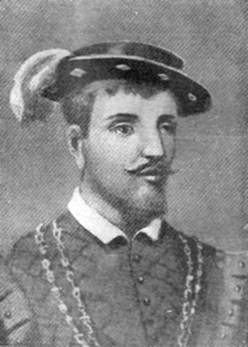Juan Jufré facts for kids
Quick facts for kids
Juan Jufré
|
|
|---|---|

Juan Jufré
|
|
| Born | 1516 |
| Died | 1578 Santiago
|
| Nationality | Spanish |
| Occupation | conquistador, administrator |
Juan Jufré de Loayza y Montesa (1516–1578) was a Spanish explorer and leader. He was known as a conquistador, which means he helped Spain take control of new lands. Juan Jufré joined the important trip to Chile in 1541 with Pedro de Valdivia. He became the first mayor (called an alcalde) of Santiago, Chile in 1541. He also served as governor for the Argentine area of Cuyo. Juan Jufré helped start the city of San Juan de la Frontera. He also helped rebuild the city of Mendoza.
Contents
Juan Jufré's Early Life and Adventures
Juan Jufré was born in 1516 in Medina de Rioseco, a town in Valladolid, Spain. His parents were Francisco Jufré de Loayza and Cándida de Montesa.
Arrival in the Americas
In 1538, Juan Jufré traveled to the Americas. He arrived with Captain Juan Martin de Candia. They journeyed from Panama to Peru. Soon after, he moved to Chile with Captain Pedro de Valdivia.
Helping to Build Santiago
Juan Jufré was there when the city of Santiago was founded. This happened in 1541. He also took part in the first battles against the native people.
Juan Jufré's Role in Conflicts and Leadership
Juan Jufré was a key figure in many important events. He helped lead during times of war and peace.
Fighting in Peru and Chile
In 1547 and 1548, Jufré went back to Peru. He helped Pedro de Villagra fight in a civil war there. After returning to Chile, he joined the Arauco War. This was a long conflict against the Mapuche people. He became a captain and a justice in the Arauco Province.
After Valdivia's Death
After Pedro de Valdivia died in Tucapel in 1553, Jufré helped people in the south. He made sure they had food. In 1554, he stopped a rebellion by the Promaucaes people. This happened in Gualemo, near the Lontué River. This area is now the province of Curicó.
Battles and City Building
Jufré later fought against Lautaro, a Mapuche leader. He also joined the campaigns led by García Hurtado de Mendoza. In 1559, he helped rebuild the city of Concepción.
Governor of Cuyo
When Francisco de Villagra became governor of Chile, Jufré received a new role. In 1561, he was named Lieutenant Governor of the Province of Cuyo. This area is now part of Argentina. There, he founded the city of San Juan de la Frontera. He also helped rebuild Mendoza.
Returning to Chile
In 1562, Jufré returned to Chile. A new Mapuche revolt had started. He became a lieutenant to the Governor of Chile. He helped organize support for the war in the south. He continued to fight in this war for more than ten years.
Serving in Santiago's Government
Juan Jufré held many important jobs in the Cabildo of Santiago. The Cabildo was the city council.
Different Roles in the Cabildo
Between 1550 and 1570, he served as an alcalde (mayor or magistrate). He was also a regidor, which was like a council member. In 1556, he was the royal alferiz for the city. This was a high-ranking official role. From 1562 to 1563, he was the corregidor. This meant he was a local administrator. In 1568, he represented Santiago before the Real Audiencia. This was a high court in Concepción.
Juan Jufré's Business Ventures
Juan Jufré became very wealthy by starting important businesses in Chile.
Building and Farming
He built the first shipyard near the Maule River. This was on his land called an encomienda in Pocoa. An encomienda was a grant of land and native labor given to a Spanish colonist. He also planted the first vineyards on his encomienda in Macul, near Santiago. He made wine there and sold it in Peru. He also sold other goods. He used his own ships for trade.
Mills and Factories
In 1553, he built a mill on the Mapocho River. Later, he started a textile factory. This factory was located between his two encomiendas, Mataquito and Peteroa. These were on the banks of the Mataquito River.
Juan Jufré died in Santiago in 1578. He was buried at the Church of Santo Domingo.
See also
 In Spanish: Juan Jufré para niños
In Spanish: Juan Jufré para niños
 | Jewel Prestage |
 | Ella Baker |
 | Fannie Lou Hamer |

